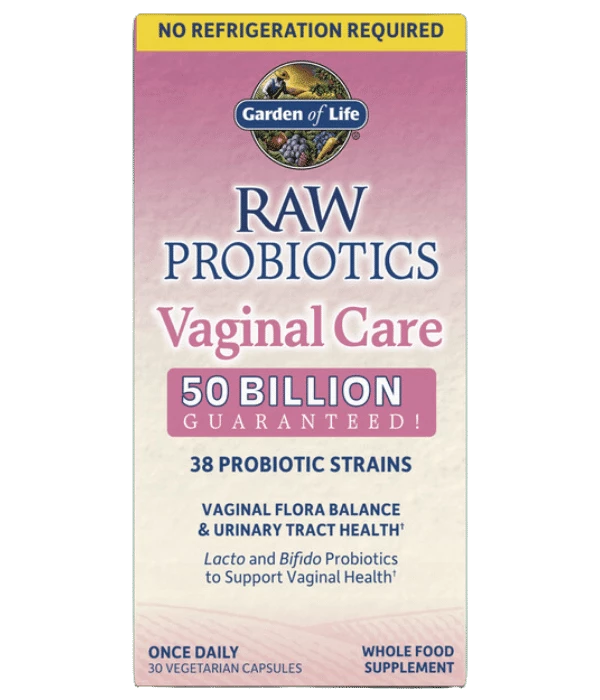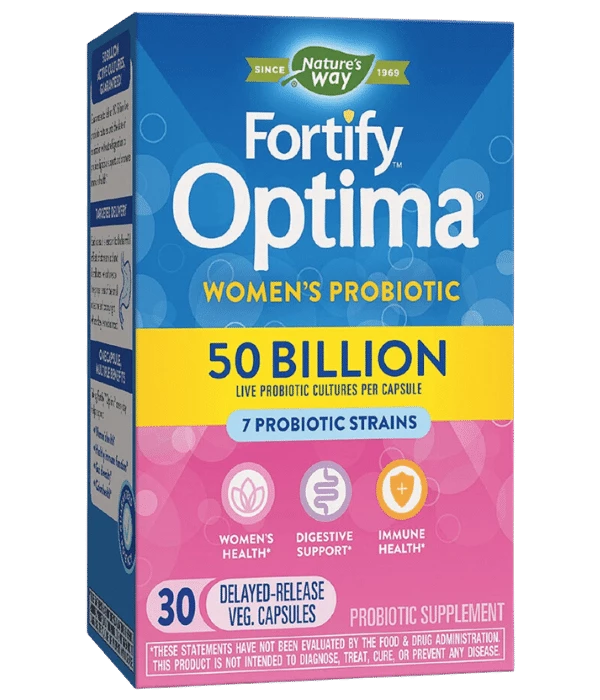Try our favorite, clean protein powder: See our top pick →
Try our favorite, clean protein powder: See our top pick →
This post contains links through which we may earn a small commission should you make a purchase from a brand. This in no way affects our ability to objectively critique the products and brands we review.
Evidence Based Research To fulfill our commitment to bringing our audience accurate and insightful content, our expert writers and medical reviewers rely on carefully curated research.
Read Our Editorial Policy
Probiotics are becoming an increasingly common fixture in supplement cabinets to improve digestion—but did you know that they can also target women-specific health concerns, like yeast infections and vaginal health?
In addition to the critical job of supporting the gut microbiome, beneficial bacteria can also help balance the vagina microbiome to protect against dreaded infections like bacterial vaginosis or yeast infections—and supplemental probiotics like these are one way to do so.

WiseHuman contains prebiotics to support gut health and 20 billion CFU of patented, qualified, and doctor-formulated probiotics.
For a limited-time, WiseHuman is offering TNI readers their best discount ever! Use code INSIDER35 (automatically applied) to get an EXTRA 35% off. Click the button now to access the deal!
Best Overall | for Gut Health | Best Value | |
|---|---|---|---|
| Product | Garden of Life | WiseHuman | Nature’s Way |
| Benefits | Vaginal health; Urinary tract health; Preventing yeast infections | Digestive support; Vaginal health; General women’s health | Digestive support; Immune support; Vaginal health |
| CFU & Strains | 50 billion CFUs from 38 strains; Fruit and vegetable blend | 20 billion CFU from 9 strains; Prebiotic fiber | 50 billion CFUs from 7 human digestive strains |
| Cost | $44.99 for 30 servings Shop Now | $42.99 for 30 servings Shop Now | $31.49 for 30 servings Shop Now |
Although it can be tricky to navigate the hundreds of probiotic supplements lining the aisles (virtual or otherwise), we’ve got you covered with the seven best probiotics for women and why we chose them.
Best for: Women struggling with yeast, vaginal, or urinary infections.
Garden of Life Raw Probiotics Vaginal Care is one of the best probiotics for supporting vaginal health, with 50 billion live bacterial cells guaranteed from a record-setting 38 bacterial strains.
The bacterial strains in this supplement are thought to promote yeast balance, vaginal health, and urinary tract function.
Uniquely, it also contains the yeast-digesting enzymes cellulase, hemicellulase, and lysozyme, which help to break down yeast cell walls and prevent yeast infections.
Plus, this Garden of Life probiotic utilizes an Eastern European wild kefir culture that provides dozens of beneficial probiotic strains and a fruit and vegetable blend of red bell pepper, green pea, carrot, plum, cherry, strawberry, and raspberry.
Best for: Women looking for additional digestive support, including with regularity, gas, and bloating.
Lastly, we like WiseHuman Women’s Daily Probiotic for women needing some additional digestive support.
With prebiotics and 20 billion CFUs of probiotics, this supplement is designed to support digestive, vaginal, and immune health.
It contains XOS—xylooligosaccharides—which are prebiotics that help promote regularity and don’t tend to cause gas or bloating, as other prebiotics sometimes do.
Plus, this supplement is doctor-formulated by Dr. Jeremy Burton, a recognized international expert on the microbiome.
Best for: Combined vaginal, digestive, and immune support on a budget.
Nature’s Way Fortify Optima Women’s Probiotic is a shelf-stable probiotic supplement containing 50 billion CFUs from seven bacterial strains.
These delayed-release capsules ensure that the probiotics reach where they need to—the large intestine—without being first killed off by the harsh acidity of the stomach.
Some prominent bacterial species found in this supplement include a high ratio of Lactobacilli to promote vaginal health and Bifidobacteria, which are incredibly beneficial bacteria for supporting digestive function.
The Nature’s Way probiotic utilizes 100% HDS—human digestive strains—which have been isolated from natural human intestinal microbiota (as opposed to being isolated from animals, plants, dairy, or soil), so they are already adapted to thrive in the human gut.
Best for: Those on a budget seeking general support for women’s health.
Although best known for their high-quality omega-3 supplements, Nordic Naturals also has a wide array of other supplements, including the Nordic Flora Probiotic Daily.
This supplement contains 12 billion CFUs, including the first commercialized probiotic for dietary supplements, Lactobacillus acidophilus DDS-1, combined with the prebiotic fiber FOS (fructo-oligosaccharide).
The combination of prebiotics and probiotics is beneficial because prebiotics are fibrous carbohydrates that good bacteria require to grow and thrive—without prebiotics in the gut, supplemental probiotics won’t be able to “take hold” and survive.
Although this supplement isn’t explicitly targeted to women, the probiotic species in it are helpful for digestive health, which females are more likely to have issues with.
For example, two out of three IBS (irritable bowel syndrome) sufferers are female, and probiotics, including Lactobacillus and Bifidobacterium strains, are beneficial for mitigating IBS symptoms.
Best for: Women with recurring yeast or vaginal infections.
With 42 billion viable probiotic cells at the time of manufacturing, the Flora Super 8 Hi-Potency Probiotic lives up to its “high potency” name—plus, it guarantees a minimum of 25 billion viable cells per capsule by the expiration date.
This supplement contains eight probiotic strains from the Lactobacillus and Bifidobacterium families, which are thought to support vaginal and digestive health.
The higher concentration of L. acidophilus was designed to help maintain proper yeast balance in the body, translating to a more acidic vaginal pH that fights against pathogenic species.
Research has shown that a combination of Lactobacillus rhamnosus and Lactobacillus acidophilus bacteria—both of which are found in the Flora Super 8 probiotic—inhibited the activity of pathogens responsible for the vaginal infections of bacterial vaginosis (BV) and aerobic vaginitis.
Best for: Women with both digestive and vaginal health concerns.
Designed specifically for women, the Solaray Mycrobiome Probiotic Women’s Formula also boasts a high bacterial count, with 50 billion CFUs per capsule.
This supplement contains 24 bacterial strains and prebiotic fiber that supports the viability of healthy probiotics.
One of the prominent probiotics in this supplement is Lactobacillus plantarum, which has been found to improve vaginal colonization of lactic acid bacteria—thereby lowering vaginal pH—which may be able to prevent yeast infections.
Best for: Women able to spend extra money on a high-strength probiotic for digestive and vaginal support.
With 17 potent strains of healthy bacteria, the Hi-Health Chime Probiotics Women’s Formula contains an impressive 90 billion cultured cells per capsule to support women’s health.
One of the prominent strains in this supplement is Lactobacillus reuteri, a beneficial bacteria linked to vaginal health.
These capsules are coated with gellan gum, which protects the probiotics from being killed off in the stomach’s acidic environment by forming a gel barrier that breaks down after it passes into the large intestine.
The healthy bacteria will be able to travel to the lower gut due to this delayed-release gellan gum-coated capsule, where they can then be colonized in the intestinal environment with the addition of prebiotic fibers.
Best for: Those wanting all-around, high-potency support for multiple women’s health issues.
Designed just for women, the Garden of Life Dr. Formulated Probiotic was created by board-certified neurologist and gut microbiome expert Dr. David Perlmutter, M.D. to target vaginal, immune, and digestive health.
This once-daily supplement has 50 billion CFUs (colony-forming units) of beneficial bacteria made up of 16 probiotics, including Lactobacillus reuteri and Lactobacillus fermentum, two documented probiotic species for women’s health.
It also contains Lactobacillus acidophilus, another well-researched probiotic species for maintaining a healthy vaginal balance.
Researchers think these three Lactobacillus species can stick to vaginal surfaces, making it more difficult for harmful bacteria to grow and spread, leading to better vaginal health.
Lactobacillus bacteria can flourish in the anaerobic (oxygen-lacking) vaginal environment, producing antimicrobial compounds like lactic acid and hydrogen peroxide and lowering the vaginal pH to fight harmful microbes.
Further, the 16 probiotic species in this supplement are also linked to digestive and immune system health.
As far back as the 1600s, renowned scientists like Antonie van Leeuwenhoek changed the world by first viewing bacteria under a microscope.
But despite the pioneering discoveries of these early microbial researchers, he and other fathers of microbiology viewed bacteria primarily as disruptive and disease-causing.
Only in the past two decades or so have we truly begun to understand how much we need microbes—especially in our guts—and how poorly we feel when we don’t have adequate amounts and diversity of them.
One way to support our the diversity and strength of our gut microbiomes is with probiotics.
With the name probiotic meaning “for life,” probiotics are healthy bacteria that benefit the host when consumed.
The five-foot-long tube in our lower guts known as the large intestine (or colon) can house upwards of 100 trillion microbes comprising thousands of species ranging from harmful to neutral to beneficial.
Coined as the gut microbiome in 2001, this collection of microflora can be imagined as a lush rainforest.
Just like a healthy rainforest needs diverse plant and animal life to flourish, our microbiome also requires a wide variety of bacterial species to thrive and remain in balance.
When our gut microbiomes become out of whack, dysbiosis—an imbalance of good and bad bacteria—can develop.
Dysbiosis is a common cause of digestive problems, so repopulating your gut microbiome with friendly bacteria can help.
While you can rebuild the bacterial rainforest in your gut by consuming probiotic-rich fermented foods like sauerkraut, kimchi, and kefir, many people shy away from these products.
Although delicious, some are off-put by fermented foods’ sour or “funky” taste, sometimes higher price points, and potentially low accessibility.
Another option is supplemental probiotics, which can provide a targeted approach to repopulating the microbiome with healthy bacteria.
Not only do probiotics support gut health, but a healthy microbiome is also linked to better mood, skin, immunity, cognition, and metabolism.
When it comes to women’s health, probiotics can also target the vaginal microbiome.
One of the critical components of vaginal health is its pH, as a more basic pH allows unhealthy bacteria and yeast to multiply and cause infections.
Higher vaginal pH (above 4.5) is too acidic for these pathogens to grow, and probiotic bacteria can help to keep the acidity where it needs to be.
According to a review published in the journal Microbial Cell Factories, some of the probiotic species that have been most studied for their beneficial effects on vaginal health include:
Supplemental probiotics have also been found to improve the symptoms of many digestive and non-digestive disorders, including:
While there are several beneficial probiotics for women, two top-rated probiotics for women are the Garden of Life Dr. Formulated Probiotic and the Garden of Life Raw Probiotics Vaginal Care.
Although everyone is different, it’s often recommended that adults take probiotics daily, especially if you have symptoms or concerns about your digestive, immune, or vaginal health.
Typically, the best time to take a probiotic is first thing in the morning before eating or just before going to sleep at night—as long as you hadn’t eaten dinner just prior.
Probiotics tend to be the most effective when taken on an empty stomach because your stomach acid levels are naturally lower and will allow the bacteria to travel to the large intestine safely.
There are many potential signs that you might need supplemental probiotics, including any digestive concerns, poor immunity or getting sick constantly, mood disorders, acne or other skin issues, or frequent urinary tract, yeast, or vaginal infections.
This answer will vary from person to person.
If you’re typically sensitive to supplements or have severe gut issues, you may notice a difference within a few days.
For example, one review of studies found that people experiencing diarrhea had symptom relief within two days of probiotic treatment.
However, most people will take two to three weeks to notice a significant difference when taking probiotics, as the healthy bacteria need time to balance out the unhealthy bacteria and proliferate in their new environment.
This was seen in a study of people with constipation, where the participants began to see symptom improvement after two weeks of adding probiotics to their diet.
Allen SJ, Martinez EG, Gregorio GV, Dans LF. Probiotics for treating acute infectious diarrhoea. Cochrane Database Syst Rev. 2010;2010(11):CD003048. Published 2010 Nov 10. doi:10.1002/14651858.CD003048.pub3
Bertuccini L, Russo R, Iosi F, Superti F. Effects of Lactobacillus rhamnosus and Lactobacillus acidophilus on bacterial vaginal pathogens. Int J Immunopathol Pharmacol. 2017;30(2):163-167. doi:10.1177/0394632017697987
Chee WJY, Chew SY, Than LTL. Vaginal microbiota and the potential of Lactobacillus derivatives in maintaining vaginal health. Microb Cell Fact. 2020;19(1):203. Published 2020 Nov 7. doi:10.1186/s12934-020-01464-4
Chen X, Lu Y, Chen T, Li R. The Female Vaginal Microbiome in Health and Bacterial Vaginosis. Front Cell Infect Microbiol. 2021;11:631972. Published 2021 Apr 7. doi:10.3389/fcimb.2021.631972
Koebnick C, Wagner I, Leitzmann P, Stern U, Zunft HJ. Probiotic beverage containing Lactobacillus casei Shirota improves gastrointestinal symptoms in patients with chronic constipation. Can J Gastroenterol. 2003;17(11):655-659. doi:10.1155/2003/654907
Vladareanu R, Mihu D, Mitran M, et al. New evidence on oral L. plantarum P17630 product in women with history of recurrent vulvovaginal candidiasis (RVVC): a randomized double-blind placebo-controlled study. Eur Rev Med Pharmacol Sci. 2018;22(1):262-267. doi:10.26355/eurrev_201801_14128
Subscribe now and never miss anything about the topics important to you and your health.